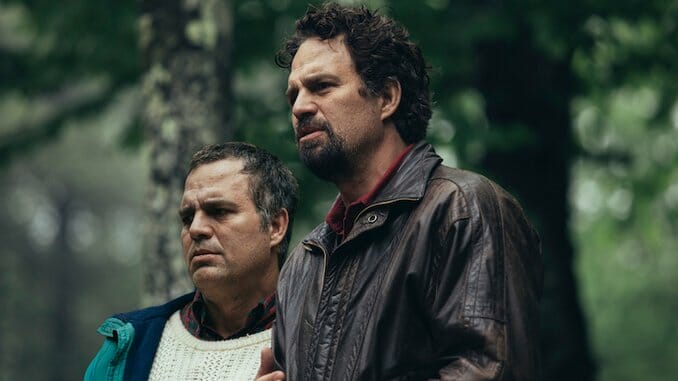HBO’s I Know This Much Is True Is an Unrelenting Sad Slog
Photo Courtesy of HBO
Timing is everything.
If you ask any accomplished person what lead to their success and they’ll tell you it’s skill, perseverance, and being at the right place at the right time. TV shows often benefit from this phenomenon. The Handmaid’s Tale , a dystopian story if there ever was one, certainly reaped the rewards of premiering shortly after Trump took office.
Right now networks and streaming platforms must be feeling the push/pull of wanting to provide new content for viewers stuck at home while balancing what kind of content viewers might actually want to see. Unfortunately for HBO, the new six-part miniseries I Know This Much is True lands at utterly the wrong time. Based on the 1998 novel by Wally Lamb, who serves as an executive producer on the series, I Know This Much Is True follows twin brothers Dominick (Mark Ruffalo) and Thomas (also Mark Ruffalo) from their time as young children growing up in Three Rivers, Connecticut, into their late thirties. Each episode weaves in and out of present (the 1990s for the series) and past showing moments from grade school, college, marriage and various tragedies. Dominick is a house painter while his brother Thomas is a paranoid schizophrenic living in a group home and working a coffee cart, until one day he decides to cut off his hand at the public library. (This graphic scene occurs at the start of the series, so I’m not spoiling anything).
Born six minutes apart but in different years, Dominick is, in every sense of the phrase, his brother’s keeper. “My brother has been an anchor around my entire life,” Dominick says. “I used to think that one day that I’d actually get away from him.” Full of pent-up rage, Dominick struggles to keep Thomas’ fragile psyche from completely falling apart and is often helpless against an institutional system that, even with good people, is damaging to his brother. Weighed down by years of regret and remorse, Dominick feels trapped. All he wants to do is leave Three Rivers but he cannot. Every time he tries to move on with his life and escape his brother’s clutches, something prevents him. He fiercely loves his brother but he also resents the responsibility being Thomas’ brother entails.
Ruffalo gives a transformative performance. Apparently a six-week break was taken between filming his Dominick scenes and his Thomas scenes. Ruffalo, who lost weight to play Dominick, took that time to gain weight resulting in a Thomas that is physically very distinct. As Thomas, Ruffalo carries himself differently with a discrete cadence and gait. While watching I had to remind myself often that Ruffalo was, in fact, playing both characters. Technology has advanced so much from say Ringer (never forget Sarah Michelle Gellar’s boat scene) that watching two Ruffalos (for the price of one!) act together is utterly seamless. This kind of tour-de-force performance is a bit of an Emmy grab but, in this case, an Emmy would be well deserved.
-

-

-

-

-

-

-

-

-

-

-

-

-

-

-

-

-

-

-

-

-

-

-

-

-

-

-

-

-

-

-

-

-

-

-

-

-

-

-

-








































